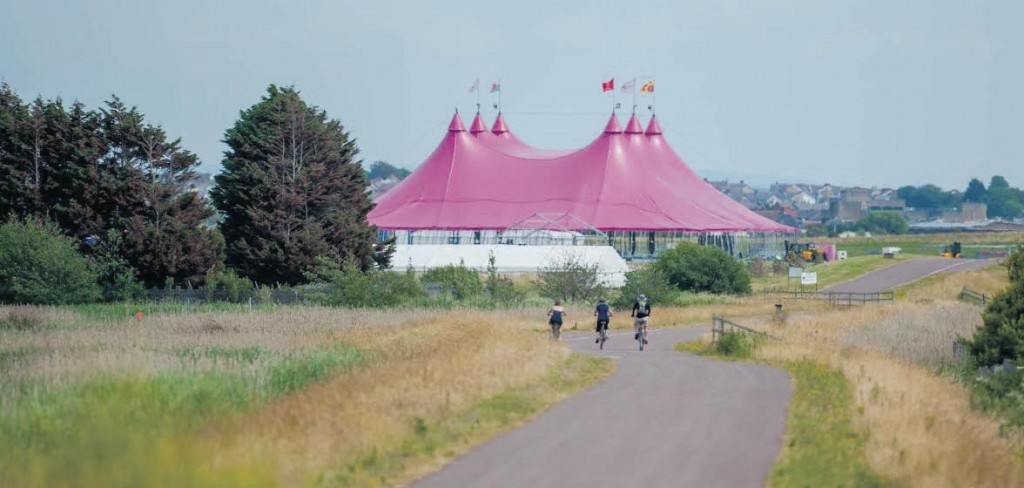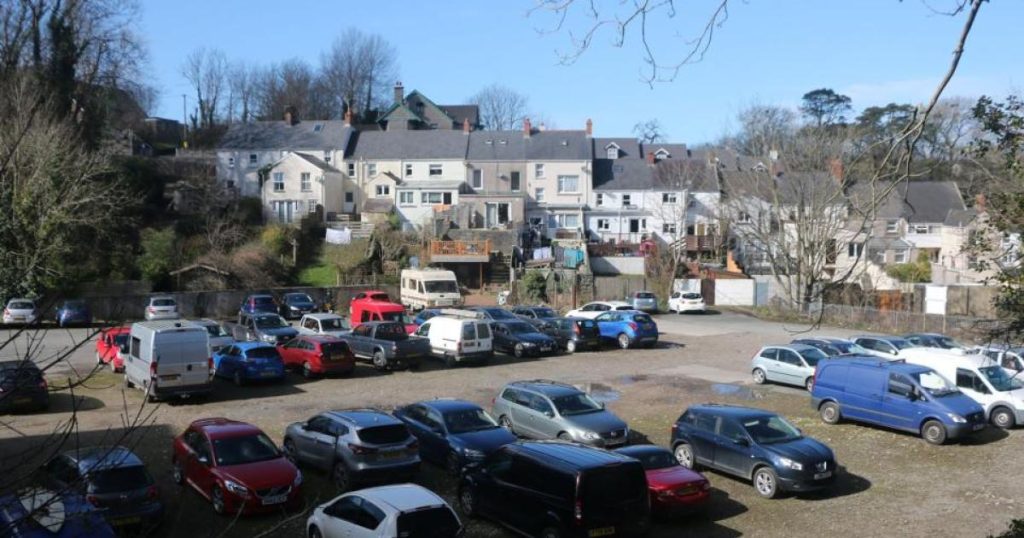Community
Officials announced for 2026 Eisteddfod in Pembrokeshire

THE NATIONAL EISTEDDFOD returns to Pembrokeshire in 2026, and organisers have named the officials who will steer this major cultural event over the next year and a half.
With the artistic and local committees already established, meetings to finalise competitions and adjudicators are underway to ensure the List of Competitions is ready by spring. Committee members have also been voting over the past weeks to elect key officials for the Executive Committee.
John Davies, former leader of Pembrokeshire County Council, has been appointed Chair of the Executive Committee. Known for his deep connection to Pembrokeshire and extensive experience with national organisations, Davies aims to make the Eisteddfod a true community event, welcoming involvement from all corners of the region.
Tegryn Jones, Chief Executive of Pembrokeshire Coast National Park, takes on the role of Deputy Chair (Strategy). With a strong passion for Welsh culture and language, Jones brings a wealth of experience working with local communities, visitors, and volunteers across three counties.
Deputy Chair (Culture) is Carys Ifan, Director of Canolfan Egin and a seasoned cultural organiser. Based in Llangrannog and originally from Llandudoch, Ifan has led numerous artistic and community projects across the region.
Cris Tomos, a community development veteran with over 30 years of experience, will lead the 2026 Eisteddfod Local Fund. Working with PLANED, a community development charity, Tomos has supported countless community enterprises and co-operatives in Pembrokeshire, Ceredigion, and Carmarthenshire.

Non Davies, recently elected as Executive Committee Secretary, brings extensive cultural management expertise as Ceredigion County Council’s Corporate Manager for Culture. Having chaired the Cardigan Local Fund Committee for the 2022 Ceredigion Eisteddfod, Davies is well-versed in managing cultural projects.
National Eisteddfod Chief Executive, Betsan Moses, said: “We’re looking forward to working with John and the team over the next few months as we prepare for the 2026 Eisteddfod.
“There’s almost a quarter of a century since the Eisteddfod was last held in Pembrokeshire, and we’re very much looking forward to returning to the area. 2026 is an important year for us as we celebrate 850 years since the first Eisteddfod was held in Cardigan Castle in 1176.
“We’re looking forward to working in a new way within a catchment area which includes parts of another two counties, which is, of course, a chance to work with local people in Ceredigion and Carmarthenshire again.”
Further announcements are expected in the coming weeks, including the sale of competition prizes and opportunities to donate the Crown and the Chair.
The National Eisteddfod will be held in Llantood from August 1–8, 2026.
Community
New parking rules spark concern at Dew Street site

Residents question phone-only payments, rising permit costs and future of former library building
RESIDENTS in Haverfordwest’s upper town say new parking rules behind the former County Library on Dew Street risk excluding older and less tech-savvy drivers, as concerns grow over both rising permit prices and the uncertain future of the prominent community building.
The car park is owned by Ateb Group, which allowed free public use over Christmas. However, signs installed this week state that drivers must pay either by phone or online.
Campaigners say both options effectively require a smartphone or internet access, leaving some motorists without a practical way to pay.
Mike Daffern, acting secretary of the Dew Street Campaign, told The Herald: “Realistically these are the same method. Both depend on a phone. For many older people, or anyone without mobile data, that simply isn’t accessible.
“Government guidance says there should be more than one way to pay. Most car parks still offer cash or card. We feel this discriminates against some of the very people who rely most on town centre parking.”

Permit prices questioned
Residents also say they were previously informed that Ateb intended to mirror the charging structure used by Pembrokeshire County Council.
They expected this would reduce the cost of residential permits. Instead, several have reported being quoted figures more than four times higher than equivalent council permits, alongside what they describe as a 30 per cent rise on last year.
One nearby resident, who did not wish to be named, said: “We were told it would be in line with the council. When the price came through it was nowhere near. For some households it just isn’t affordable.”
The Herald has approached Ateb for clarification on its pricing structure and the choice of payment systems.
Building left in limbo

Beyond parking, frustration is mounting about the long-term future of the former library itself.
Planning permission to refurbish the site was granted in 2023, but residents say little visible progress has been made. There is speculation the housing association may instead base operations in Milford Haven following the closure of Meyler House.
Campaigners argue that if the building is no longer required for offices, alternative community uses should be explored rather than allowing further deterioration.
A petition signed by ninety-five locals has been submitted to Cadw requesting the structure be considered for listing.
The request is backed by Royal Commission on the Ancient and Historical Monuments of Wales and The Twentieth Century Society, both of which recognise its architectural significance as an example of late 20th-century civic design. The building also features in Simon Phipps’ book Brutal Wales / Cymru Friwtalaidd, which celebrates modernist architecture across Wales.
Mr Daffern said: “It’s part of Haverfordwest’s story. Even people who don’t love the look of it accept it’s an important public building. Leaving it empty helps no one.”

Temporary arrangement
Public use of the car park may only ever be short-term. The 3.5-acre site, including the former library, was sold by the council for £250,000 in 2022.
A consultation held in early 2024 on potential redevelopment proposals drew criticism, with some residents describing suggested housing plans as “cut-price” and out of keeping with the conservation area surrounding the historic upper town.
No formal planning application has yet been submitted.
Residents say clearer communication is needed on both the future of the land and day-to-day parking arrangements.
Mr Daffern added: “People understand the site will change one day. But while it’s open, it should be fair and accessible. All we’re asking for is common sense and proper engagement with the community.”
Community
50s women threaten legal action over pension compensation refusal

Campaigners say government decision ‘irrational and unlawful’ as ministers defend position
WOMEN born in the 1950s are threatening a Judicial Review after the UK Government refused to introduce a compensation scheme for those affected by changes to the State Pension age.
Campaign groups representing thousands of women across Wales say the decision by the Secretary of State for Work and Pensions is “legally flawed and procedurally unsafe”, arguing that ministers have relied on incomplete evidence while ignoring long-standing claims of maladministration and discrimination.

But the UK Government maintains that, while mistakes were made in communication, there is insufficient evidence that most women suffered direct financial loss as a result.
The row centres on the long-running dispute over changes to the State Pension age, which saw the retirement age for women rise from sixty to sixty-six, bringing it into line with men. Many women say they were given little or no notice, leaving them unable to plan financially.
Ombudsman findings
In 2024, the Parliamentary and Health Service Ombudsman (PHSO) concluded that the Department for Work and Pensions (DWP) was guilty of maladministration in how it communicated the changes.
The Ombudsman recommended compensation, suggesting payments could range from £1,000 to nearly £3,000 depending on impact.
However, in December, Paymaster General Pat McFadden MP said the Government would not implement a blanket compensation scheme, arguing that evidence did not show widespread financial injustice directly caused by the communication failures.
Campaigners say that stance is wrong in law.
‘Not new evidence’
Groups including 1950s Women of Wales & Beyond, 50s Women United, and Pension Partners for Justice claim ministers relied on what they described as “new evidence” to justify rejecting compensation.
They argue the material had already been available for years and therefore provides “no lawful basis” to overturn the Ombudsman’s conclusions.
In a statement, a spokesperson said: “To accept maladministration while denying financial loss is internally inconsistent.
“The Department’s failure deprived women of the opportunity to make informed decisions about retirement. Many incurred real, quantifiable losses – from depleted savings to forced early retirement and reliance on benefits.”
Campaigners also claim key testimony from former DWP ministers was omitted from the Ombudsman investigation, and that evidence of discrimination was not fully considered.
They say relying on what they call an “incomplete and selective report” leaves the Government open to legal challenge.
Political pressure in Wales
The issue has also been raised in the Senedd.
Plaid Cymru Deputy Leader Delyth Jewell MS recently pressed Welsh ministers to back affected women and push for engagement with campaigners.
Organiser Jackie Gilderdale said many Welsh women feel excluded from discussions.
“This campaign is not a brand or a limited company – it is real women whose lives were turned upside down,” she said.
“We don’t want another court battle. We want dialogue and a political solution. But if the door remains closed, Judicial Review remains an option.”
A petition calling for structured mediation between government and representative groups has already gathered more than 34,000 signatures.
Government position
The UK Government has previously said that most women were aware of the changes and that modelling showed limited evidence of widespread direct financial loss caused solely by communication failures.
Ministers have also pointed to the overall cost of compensation, which could run into billions of pounds.
Public law experts note that while maladministration findings are serious, compensation is not automatic and governments retain discretion over how – or whether – to implement financial redress.
Long-running dispute
The dispute has been ongoing for more than a decade and has become one of the most persistent pension justice campaigns in the UK.
Women’s groups argue many lost up to six years of expected pension income, with some estimating personal losses of tens of thousands of pounds.
Successive governments, however, have resisted calls for mass compensation, saying equalising the pension age was necessary for fairness and sustainability of the system.
For many campaigners, the fight is far from over.
“We are not going away,” the groups said.
Community
Haverfordwest students win national King’s Trust honour

Community mural project earns Wales title and trip to London finals
A GROUP of young people from Haverfordwest High School are celebrating a major achievement after being crowned Wales country final winners at the King’s Trust Awards 2026.
The students secured the JD Foundation Community Impact Award and will now represent Wales at the King’s Trust National Awards in London.
The award recognises an outstanding community project delivered through the King’s Trust Achieve Programme, a Key Stage four GCSE option offered at the school and delivered locally by Pembrokeshire Youth Service.
Led by school-based youth worker Ell Lewis, the programme supports pupils who may find traditional academic routes challenging, including those facing emotional, social or caring responsibilities.
As part of their Community Impact project, the group identified a vandalised pedestrian tunnel in Haverfordwest that is used daily by students travelling to and from school. Determined to improve the space, they worked together to design and paint a large-scale mural celebrating wellbeing, identity and local pride.
The once run-down underpass has now been transformed into a colourful and welcoming feature, drawing praise from residents and passers-by.
Community members described the artwork as uplifting and inspiring, with many noting the positive difference it has made to young people using the route each day.
One participant said: “This project is our legacy. We’ve created something lasting that represents who we are and where we come from. It’s amazing what a cup of tea and a conversation can lead to.”
Mr Lewis said the benefits extended far beyond the finished mural.
He said: “Beyond its physical impact, the project has helped the young people build confidence, teamwork, leadership and communication skills. Their courage, resilience and ambition can’t be faulted. I am incredibly proud of them. All members of the group have since progressed into further education or employment.”
The students secured funding through the Pembrokeshire Youth Bank Grant and received support from local businesses including GD Harris & Sons. They also worked with local councillors, the local authority and local artist Lloyd Griffiths.
Additional funds were raised through school-led activities including bake sales and raffles.
The group will now travel to London to compete in the national finals, representing both their school and Pembrokeshire on a national stage.
Cover photo:
Proud moment: Members of the Haverfordwest High School group at the Wales King’s Trust Awards ceremony (Pic: Supplied).
-

 Health4 days ago
Health4 days agoConsultation reveals lack of public trust in health board
-

 News5 days ago
News5 days agoCaldey still unsafe, survivors warn — despite Abbey’s reform claims
-

 Community5 days ago
Community5 days agoPembrokeshire students speak at national Holocaust Memorial Day event
-

 News7 days ago
News7 days agoWales warned against single police force as Lib Dems cite Scotland ‘lesson’
-

 Crime7 days ago
Crime7 days agoMilford Haven man appears in court charged with burglary and GBH
-

 Business7 days ago
Business7 days agoDuke of Edinburgh Inn in Newgale on the market for £325,000
-

 Local Government7 days ago
Local Government7 days agoTribunal over former Neyland councillor’s conduct adjourned
-

 News5 days ago
News5 days agoKurtz raises Gumfreston flooding in the Senedd as petition deadline nears


























